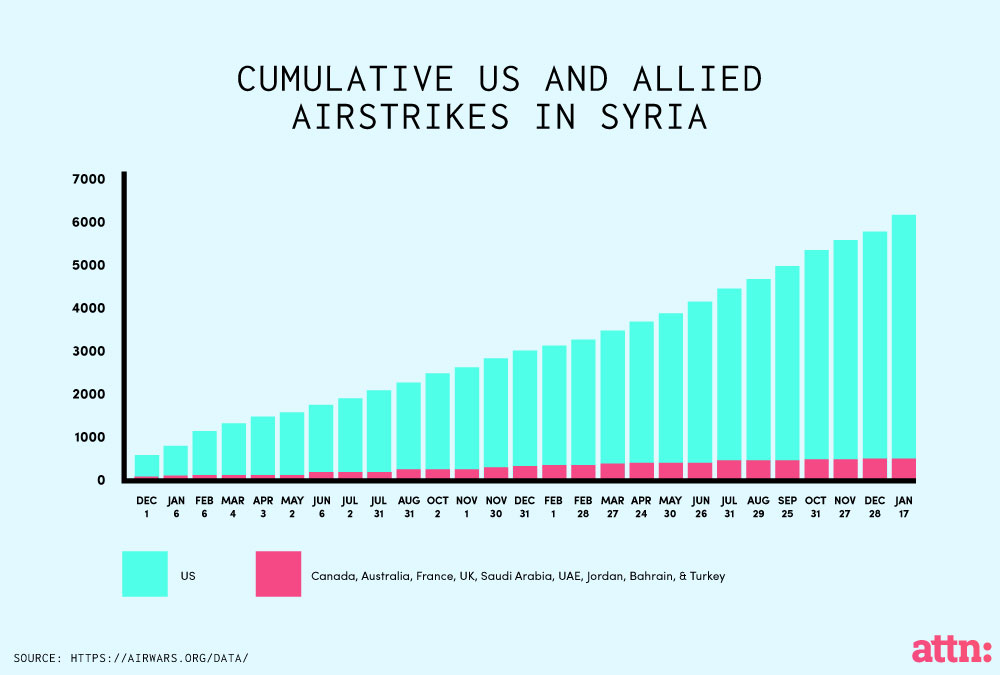Here's Why the War on ISIS Killed a Lot More Innocent People Last Year

By:
The war on the self-styled Islamic State is being won, according to official statistics, with the extremist group losing ground and manpower in both Iraq and Syria.
But gains on the battlefield are coming at an increasingly high cost to civilians.
A new report suggests that hundreds more innocent women, men, and children have been killed by the U.S. and its allies than has been officially acknowledged, with a "dramatic jump" in civilian deaths coming in the last year, according to Airwars, a nonprofit effort by a team of independent journalists to track civilian casualties.
 Flickr/U.S. Air Force - flickr.com
Flickr/U.S. Air Force - flickr.com
"Collateral damage" was up 70 percent in 2016 over the year before, Airwars reported.
The rise in casualties is not entirely accidental. It follows a U.S. military decision early last year to carry out airstrikes on extremists even when it's believed those attacks will probably kill as many as 10 innocent people, USA Today reported.
An international coalition led by the United States began targeting the Islamic State in Iraq in August 2014, expanding airstrikes to Syria a month later — and dropping and firing more than 65,000 bombs and missiles in the 30 months since. That and U.S. support for forces in Iraq and Syria fighting on the ground has inflicted heavy losses on the group.
But the war isn't killing only terrorists.
"It is more likely than not [that] at least 188 civilians have been unintentionally killed by coalition strikes since the start of Operation Inherent Resolve" in the past two and a half years, the U.S. Central Command's press office said in a statement provided to ATTN: Some 141 of those deaths occurred in 2016. No other member of the coalition — which includes France, Britain, and Saudi Arabia, among others — has admitted to killing a civilian.

Chris Woods, director of Airwars, suspects the real civilian toll is much higher than any government is willing to admit.
Indeed, the U.S. government's count accounts for "less than one in 10 of the fatalities likely to have occurred," Woods told ATTN:.
Airwars' latest assessment estimates that the U.S.-led air campaign against the Islamic State likely killed between 1,237 and 1,901 civilians in Iraq and Syria last year, bringing the civilian toll from more than two years of airstrikes to no fewer than 2,200.
The rising civilian toll comes as the U.S. and its allies seek to push the Islamic State out of the Iraqi city of Mosul — home to 1.8 million people prior to ISIS's takeover in 2014 — and the Syrian city of Raqqa, the extremist group's self-declared capital. The shift to fighting in more populated areas led to the estimated 70 percent rise in civilian casualties, Woods told ATTN:
There have been a number of reported high-casualty incidents that suggest a greater willingness to use force on the part of the U.S.-led coalition when civilians might be in danger, particularly in Syria.
A series of bombing raids last July on the city of Manbij in Northern Syria led to what Airwars termed a "catastrophic event": the killing of between 78 and 203 people, including entire families. Local activists told The Daily Beast the casualties were buried in mass graves.
The U.S. has admitted to killing 24 civilians in the city, which was liberated from ISIS by the U.S.-backed Syrian Democratic Forces, a coalition of rebel forces dominated by the YPG, a Kurdish militia.
Between 654 and 1,058 Syrian civilians were likely killed by the coalition in 2016, twice as many as the year before, Airwars reported.
"We regret the unintentional loss of civilian lives resulting from coalition efforts to defeat [ISIS] in Iraq and Syria and express our deepest sympathies to the families and others affected by these strikes," CENTCOM said.
The U.S. military has not offered anything more than sympathies to affected families, such as condolence payments like those made to relatives of civilians killed in Afghanistan, In These Times reported. That's in part because "traditional investigative methods, such as interviewing witnesses and examining the site," are unavailable to its investigators as those sites are often in the middle of war zones, the military said.
But compensation has not been forthcoming even in liberated areas such as Manbij in Syria.
There's broad support for the use of airstrikes by a U.S. public spooked by acts of terror at home and abroad.
“Obama was able to increase dramatically airstrikes on Syria and Iraq during his last two years in office and still claim to have limited U.S. intervention because the War on Terror has become so entrenched and normalized, with states across the globe taking part,” Ramah Kudaimi, a Syrian-American activist and member of the Muslim American Women's Policy Forum, told ATTN:. "It is completely accepted that terrorism is a major problem,” Kudaimi said, “and that it must be defeated by bombing and destroying the places where the terrorists come from.”
Trump has promised to "bomb the hell out of ISIS" wherever it may be — even if past wars he's criticized, like the invasion of Iraq, suggest a lasting peace depends not on air power, but a political solution.
“Trump's wanting to better relationships with Russia as well as with regimes across the region is also troubling as it seems it is going to open the door for greater coordination amongst various states to come together,” Kudaimi argued, “not to end any of the conflicts in the region justly, but rather to drop even more bombs, killing even more people, and further exacerbating the refugee crisis.”
